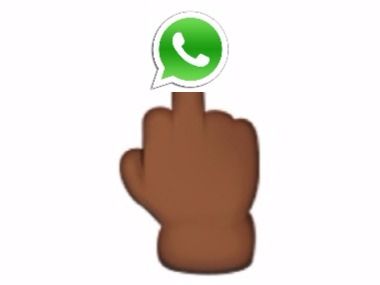Recently, an Indian lawyer, Gurmeet Singh, sent a legal notice to WhatsApp asking the popular mobile app to remove the middle finger emoji on the grounds that the gesture is obscene and illegal in India. While WhatsApp has refused to comply with the notice and it remains to be seen how the matter will finally be settled, this is not the first time that someone in India has used the law against the middle finger gesture.
>Finger-flipping in India and Indian law on obscenity
As recently as November 2017, a 21-year-old man was arrested in Delhi for showing his middle finger to a woman while driving on the road; one of the sections under which he was booked was section 509 of the IPC (word, gesture or act intended to insult the modesty of a woman), the same section which formed the basis for Singh’s complaint against WhatsApp.
Section 509 of the IPC punishes any individual who utters any words/sound or makes any gesture or exhibits any object so that such word/sound/gesture/object should be heard/seen by a woman with the intention to “insult the modesty” of the woman. The middle finger traditionally represented a phallus (a penis, especially when it is erect) which is why it was considered disrespectful to flash one’s middle finger at a woman. The noteworthy feature of section 509 is that it is gender-specific therefore, if an individual flashes their middle finger at a man, this would not be covered by section 509.
Singh also alleges that section 354 of the IPC applies in this case. Section 354 of the IPC is again, gender-specific and punishes an individual who assaults or uses criminal force against a woman with the intention or knowledge that he will outrage her modesty. It is difficult to apply this provision to WhatsApp’s middle finger emoji because the element of assault or criminal force is not present in this case.
Interestingly, section 66A of the Information Technology (IT) Act, 2008 which criminalised sending of offensive messages through communication services was struck down by the Supreme Court of India in Shreya Singhal v. Union of India in 2015 on grounds that section 66A violated the fundamental right to freedom of speech and expression. Therefore, at present there is no provision in the IT Act which covers transmission of ‘offensive’ messages such as emojis.
>Laws against finger-flipping around the world
In the UAE, judicial precedent has established that the act of flashing the middle finger is considered a crime breaching a “victim’s pride, honour and modesty” under the UAE Penal Code and judges have the power to pass deportation orders against convicted offenders. In 2010, a British expatriate was arrested in Dubai for allegedly flipping his finger during an argument. In June 2017, a woman was arrested in Dubai for flashing her middle finger in a road rage incident.
In November 2017, a US company fired a woman for flipping her finger at Donald Trump’s motorcade rally, on the grounds that she had violated the social media policy of the company covering ‘obscene’ content on social media (the woman had posted her finger-flipping picture on her social media account). There are also instances when individuals have been prosecuted under state and federal laws in the US for flashing their middle finger at fellow civilians.
In September 2017, English footballer Dele Alli faced the prospect of a ban from international football after he raised his middle finger during a match between England and Slovakia. Interestingly, in Britain, the ‘V’ shaped sign (which many of us identify as a victory sign) represents a “double phallus” and is considered offensive.
>Freedom of Speech and Meaning of Obscenity
In June 2015, a man was fined £523 in Dubai under the Cyber Crimes Law for swearing at his colleague over WhatsApp. According to Dubai-based criminal defence lawyer, Abdullah Yousef Al Nasir, sending a middle finger emoji on one’s phone could also potentially land a person into legal trouble in Dubai.
WhatsApp in its ‘Terms of Service’ states that submitting content (through status updates, profile pictures or messages) which is obscene, illegal and violative of its Terms of Service, for which Whatsapp can ban a user. However, it is hard to conceive of Whatsapp banning its users merely over using the middle finger emoji, especially since Whatsapp is facilitating the use of the emoji by providing such a feature in the first place.
Singh’s complaint against Whatsapp raises issues of freedom of speech. In cases where individuals have been prosecuted in the US for flashing their middle finger, higher courts are known to reverse the rulings on appeal as the middle finger gesture is treated as free speech under the First Amendment to the US Constitution.
There are other problems which arise from classifying certain gestures as innately “obscene”” for instance, the classification can fail to take into account the cultural differences. For instance, the thumbs-up gesture (and not the middle finger emoji) is equivalent to showing someone the middle finger in Afghanistan, Greece, Iran and parts of Italy; does this mean that Whatsapp should remove the thumbs-up emoji (the use of which is quite common among WhatsApp users) from its array of emojis too? Whether or not something is considered obscene should therefore be determined according to the cultural context of a situation, instead of an absolute prohibition on the use of certain emojis or gestures.
In 2008, a US law professor, Ira Robbins, argued that laws on obscenity which punish use of the middle-finger gesture violate freedom of speech, fundamental principles of criminal justice, waste judicial resources and do not make sense in the present era when the gesture has become ubiquitous and is no longer obscene.
To determine whether WhatsApp should be obliged to remove the middle finger emoji, Indian courts will necessarily have to decide whether use of the gesture is still considered offensive in India. It might be hard to establish that the middle finger emoji is offensive in all situations, especially since words which were once considered offensive (such as ‘f**k’) have become part of everyday language ” therefore, if someone is stopped from using an equivalent emoji to represent those words, it could be a violation of the right to freedom of speech and expression of mobile users in India.
Devika Agarwal is an intellectual property rights lawyer










